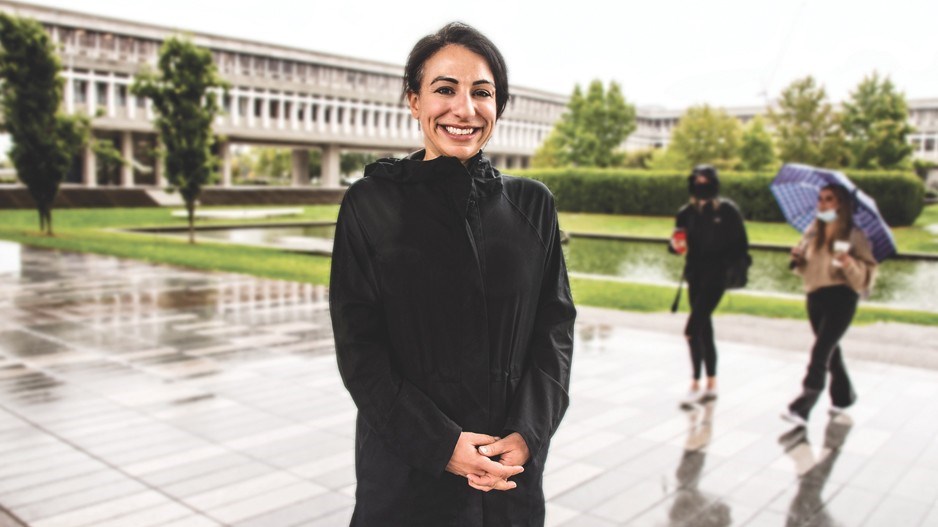British Columbians have good reason to hope that this fall and winter will be more fun-filled than last year.
Government passes are enabling access to vaccinated-only social venues, and events such as casinos, concerts and Vancouver Canucks games will be open for in-person business.
People’s social lives, however, are likely to remain somewhat less vibrant than they were pre-COVID-19, as many office employees continue to work from home, and some people are reticent to start increasing interactions with others.
This translates into the possibility that mental health issues will rise as the pandemic grinds on, Simon Fraser University associate professor of psychology Lara Aknin told BIV.
This is because “social connections are important — a key predictor of our mental health,” she said.
But the pandemic has not produced what Aknin called a “landslide of mental health concerns.”
Canadians’ collective mental health suffered a blow in spring 2020, when the pandemic was new, but largely bounced back by mid-2020, said Aknin, who is part of the Lancet’s COVID-19 Commission Mental Health Task Force, and a co-author of a peer-reviewed study set for publication in an academic journal.
That study was based on research from hundreds of studies from around the world.
Some of those studies showed that people in mid-2020 started to feel more resilient, less lonely, less prone to suicide and less socially isolated.
Despite this, Aknin’s study also found evidence that people were showing signs of strain and feeling negative emotions.
“One of the most far-reaching data points that we pulled upon to make that statement was data collected by the Gallup World Poll, which is probably the most representative sample on the planet because it surveys upwards of 150 nations,” she said.
Negative outbursts in B.C., caught on camera and disseminated on social media, often came from individuals who were asked to wear masks at fast-food restaurants. People were seen throwing coffee cups, destroying food displays and even urinating on a Dairy Queen counter.
Aknin said that it is hard to generalize, and that these outbursts may simply be reported more during the pandemic, but she added that pandemic-related mental health declines could be causing the confrontations.
One recommendation that her study has for individuals, organizations and health providers is to supplement existing mental health care with promotion of overall well-being.
“Exercise is a pretty significant predictor or important predictor of well-being,” said Aknin, who suggests people schedule breaks in their day. Gardening is another activity that is correlated with well-being, she said.
Books such as Jenny Odell’s How to Do Nothing: Resisting the Attention Economy suggest that scheduling time for mental breaks — even if it is just to take a long shower, do the dishes or stare out the window — can help de-stress people’s brains, and help people be more alert when they resume work.
While a recent study conducted by the University of British Columbia and the Canadian Mental Health Association’s B.C. division (CMHA BC) found 37% of British Columbians reported a decline in their mental health since the start of the pandemic, there is some good news.
Most British Columbians (82%) say they are coping well with the stress of the pandemic, using approaches such as walking or exercising outside (58%); connecting with family and friends virtually (40%); maintaining a healthy lifestyle (44%); keeping up to date with relevant information (38%); and pursuing a hobby (41%).
Not all mental health experts are convinced that people have been able to adjust to pandemic living or have their feelings of well-being return to pre-pandemic levels.
“The pandemic has had a profound impact on people’s mental health,” CMHA BC senior communications manager Pamela Findling told BIV.
“In recent months, in B.C., [mental health declines] have been further compounded by the severe wildfire season and the confirmation of bodies at former residential schools.”
Findling said demand for mental health services in B.C. has surged since the pandemic began.
“CMHA BC has seen more people accessing its services, websites, and resources since the pandemic, which indicates that while many people are struggling, they’re also being aware of their struggles and reaching out for help, which is so critical.”
The CMHA BC website, heretohelp.bc.ca, offers mental health and substance-use information, videos, info sheets, workbooks and screening self-tests. It has seen a 51% increase in visitors this year compared with the same time period in 2019, she said.
Referrals to the CMHA BC’s free BounceBack program, which teaches skills to help people overcome symptoms of mild to moderate depression or anxiety, have increased 49% compared with the year before the pandemic, Findling said.
She added that CMHA BC responded to the pandemic by launching a COVID-19 section of its website in April 2020. Its information and resources have been viewed more than 60,000 times.


